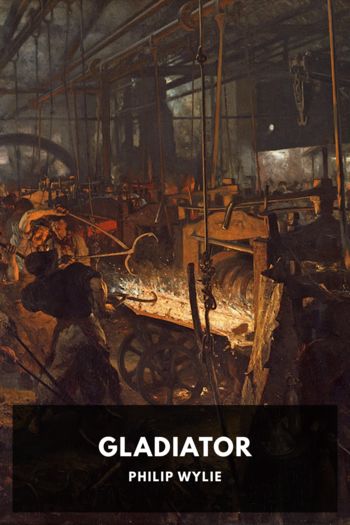Gladiator - Philip Wylie (readnow .TXT) 📗

- Author: Philip Wylie
Book online «Gladiator - Philip Wylie (readnow .TXT) 📗». Author Philip Wylie
“Now?” Hugo echoed huskily.
“Now I understand. There is no better keeping for them than your own. I give them to you.”
“Me!”
“You, son. You must take them, and the burden must be yours. You have grown to manhood now and I am proud of you. More than proud. If I were not, I myself would destroy the books here on this bed. Matilda would bring them and I would watch them burn so that the danger would go with—” he cleared his throat—“my dream.”
“But—”
“You cannot deny me. It is my wish. You can see what it means. A world grown suddenly—as you are.”
“I, father—”
“You have not avoided responsibility. You will not avoid this, the greatest of your responsibilities. Since the days when I made those notes—what days!—biology has made great strides. For a time I was anxious. For a time I thought that my research might be rediscovered. But it cannot be. Theory has swung in a different direction.” He smiled with inner amusement. “The opticians have decided that the microscope I made is impossible. The biochemists, moving through the secretions of such things as hippuric acid in the epithelial cells, to enzymes, to hormones, to chromosomes, have put a false construction on everything. It will take hundreds, thousands of years to see the light. The darkness is so intense and the error so plausible that they may never see again exactly as I saw. The fact of you, at best, may remain always no more than a theory. This is not vanity. My findings were a combination of accidents almost outside the bounds of mathematical probability. It is you who must bear the light.”
Hugo felt that now, indeed, circumstance had closed around him and left him without succour or recourse. He bowed his head. “I will do it, father.”
“Now I can die in peace—in joy.”
With an almost visible wrench Hugo brought himself back to his surroundings. “Nonsense, father. You’ll probably get well.”
“No, son. I’ve studied the progress of this disease in the lower orders—when I saw it imminent. I shall die—not in pain, but in sleep. But I shall not be dead—because of you.” He held out his hand for Hugo.
Some time later the old professor fell asleep and Hugo tiptoed from the room. Food was sizzling downstairs in the kitchen, but he ignored it, going out into the sharp air by the front door. He hastened along the streets and soon came to the road that led up the mountain. He climbed rapidly, and when he dared, he discarded the tedious little steps of all mankind. He reached the side of the quarry where he had built the stone fort, and seated himself on a ledge that hung over it. Trees, creepers, and underbrush had grown over the place, but through the October-stripped barricade of their branches he could see a heap of stones that was his dolmen, on which the hieroglyph of him was inscribed.
Two tears scalded his cheeks; he trembled with the welter of his emotions. He had failed his father, failed his trust, failed the world; and in the abyss of that grief he could catch no sight of promise or hope. Having done his best, he had still done nothing, and it was necessary for him to lie to put the thoughts of a dying man to rest. The pity of that lie! The folly of the picture he had painted of himself—Hugo Danner the scourge of God, Hugo Danner the destroying angel, Hugo Danner the hero of a quick love-affair that turned brown and dead like a plucked flower, the sentimental soldier, the involuntary misanthrope.
“I must do it!” he whispered fiercely. The ruined stones echoed the sound of his voice with a remote demoniac jeer. Do what? What, strong man? What?
XXINow the winds keened from the mountains, and snow fell. Abednego Danner, the magnificent Abednego Danner, was carried to his last resting-place, the laboratory of nature herself. His wife and his son followed the bier; the dirge was intoned, the meaningless cadence of ritual was spoken to the cold ground; a ghostly obelisk was lifted up over his meagre remains. Hugo had a wish to go to the hills and roll down some gigantic chunk of living rock to mark that place until the coming of a glacier, but he forbore and followed all the dark conventions of disintegration.
The will was read and the bulk of Hugo’s sorry gains was thrust back into his keeping. He went into the attic and opened the black trunk where the six small notebooks lay in oilpaper. He took them out and unwrapped them. The first two books were a maze of numbered experiments. In the third a more vigorous calligraphy, a quivering tracery of excitement, marked the repressed beginning of a new earth.
He bought a bag and some clothes and packed; the false contralto of his mother’s hymns as she went about the house filled him with such despair that he left after the minimum interval allowed by filial decency. She was a grim old woman still, one to whom the coming of the kingdom to Africa was a passion, the polishing of the coal stove a duty, and the presence of her unfamiliar son a burden.
When he said goodbye, he





Comments (0)